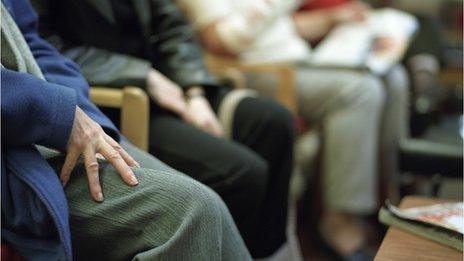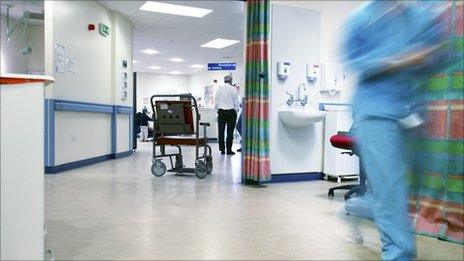Centralise stroke care 'in super units' call
- Published

Stroke care needs to be centralised in large specialist units in a radical shake-up of hospitals, experts say.
A study led by University College London found the overhaul of services in London which focused care at eight centres was saving 96 lives a year.
In comparison less far-reaching changes in Greater Manchester had less impact.
England's national stroke director Prof Tony Rudd said the research showed centralisation of care should now be spread to all urban areas.
How emergency care is organised is a pressing issue in the health service.
Last year NHS England proposed creating a network of major centres to do the most complex care.
This has already started for stroke with London and Greater Manchester undergoing reorganisations in recent years.
Survival rates
Since 2010, anyone suffering a stroke in London is taken to one of eight 24-hour specialist units rather than their nearest unit across the capital's network of 30 hospitals.
Patients are assessed immediately and given brain scans and clot-busting treatment if needed.
The units were selected to ensure that no Londoner is more than half-an-hour's ambulance journey away.
Most of the rest still carry out rehabilitation, although five do not provide any stroke care.
In Greater Manchester, only stroke patients seen within four hours of developing symptoms are taken directly to one of three specialist stroke centres with other patients taken to one of 10 district centres.
Only one of the specialist centres is open 24 hours a day and no hospitals stopped providing stroke services entirely as a result of centralisation.

The researchers - commissioned by the government-funded National Institute for Health Research - looked at stroke survival in both these areas before and after reconfiguration.
This was then compared with performance across the rest of England.
They found the survival rate increased by 1.1% in London - the equivalent of 96 lives a year - but not in Greater Manchester.
However, the length of time patients spent in hospital reduced in both cases - by 9% in Manchester and 7% in London.
Study co-author Prof Naomi Fulop said: "It may seem counter-intuitive for an ambulance to drive a critical patient straight past the nearest hospital, but it saves lives."
She said the work "clearly showed the benefits of centralisation" and other areas should consider adopting a similar approach.
Prof Rudd said he agreed. "This paper makes a strong case to centralise acute stroke care in large centres. We need to spread this model to all urban areas."
Dr Shamim Quadir, of the Stroke Association, added: "It has long been recognised that rapid, specialist medical treatment for stroke patients saves lives and reduces costs for the NHS.
"Centralising stroke care in hospitals throughout other large UK cities has the potential to save thousands of lives."
- Published13 November 2013

- Published7 March 2013
- Published1 September 2011
